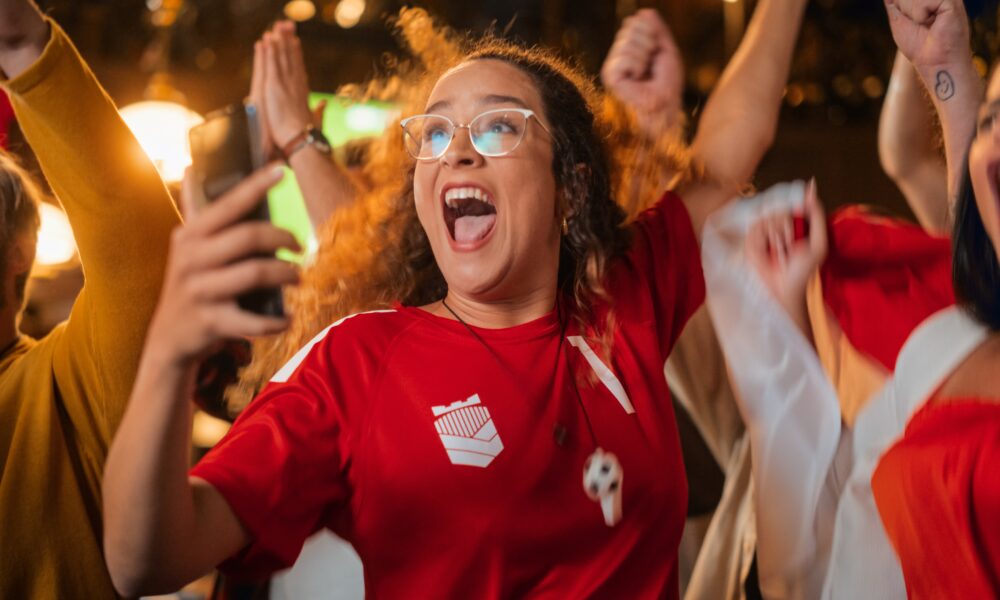I once named my fantasy football team “Brady Gaga” (drafting Jay Cutler in 2017, which tells you everything you need to know about my front-office career). I don’t remember most of the players’ names and I’m not the type to paint my face in team colors. But I love a good game. Hockey, tennis, lacrosse — I’ll watch it all. And same as a lot of women, I like to bet too.
Women are an increasingly powerful force in sports betting. The NCAA’s national survey on sports wagering found that 51% of women have placed a sports bet, compared to 68% of men (NCAA Survey). Nearly one-third of the U.S. sports betting market now comes from women, up from 21% just a few years ago. The average wager is slightly higher at $51.10 compared to $48.60 for men (Legal Sports Report).
Interest is climbing too: 25% of female sports fans over age 21 said they’re likely to place a bet this year, a five-point increase since 2023 (CivicScience). And when it comes to behavior, women often sustain engagement longer, manage their bankrolls with more discipline, and approach betting with consistency (SCCG Management).
Women are a core growth driver in sports betting. The disconnect is that most marketing still treats us like an afterthought.
Bachelorette branding
So why does so much of it look like a bachelorette party? Sparkly fonts. Pink cocktails. Stock photos of women laughing too hard at nothing. It’s giving less sportsbook and definitely more bottomless brunch.
In reality, we just need the same thing every bettor wants: real markets, real value, and a space that doesn’t pretend we just wandered in by mistake.
Sportsbooks aren’t built for us
It’s not just the campaigns. Walk into almost any sportsbook or sports bar and you know who the place was built for.
Immediate notes of dark leather and ranch. The walls are covered with TVs all tuned to men’s leagues, as if women’s sports are some rare channel package nobody can afford.
The menu? Wings. Always wings. Maybe, if you’re lucky, a sad house salad that feels like punishment.
It’s all dark and designed for people who like to yell. Women are in those spaces too, but the environment rarely admits that. And this disconnect is why so many operators fall back on surface-level “ladies-night” promos. They never did the work of designing an experience that feels inclusive from the start.
What smart marketing looks like
- Make women’s sports permanent markets.
The WNBA, NCAA women’s basketball, and women’s tennis aren’t “special events.” They’re driving sustained growth.
BetMGM reported a 133% year-over-year jump in WNBA handle and sportsbooks across the board saw sharp increases in women’s college basketball betting tied to Caitlin Clark’s breakout (MGM Resorts Investor Release; AP News).
- Tell athlete stories, not stereotypes.
Fans respond to players, rivalries, and moments that feel authentic. - Educate without condescending.
Props and parlays can be confusing for any new bettor. Quick in-app explainers or short video guides help. The tone matters: Respectful clarity builds confidence, while gimmicky “for her” tutorials drive people away. - Design for community.
Women are often the planners of group nights out. Bundle bets with entertainment, dining, or watch-party perks. When the sportsbook feels like part of the evening, it wins repeat business. - Measure what matters.
Don’t count pink social posts. Track female retention at 30/60/90 days, cross-sport engagement, and ticket size on women’s sports markets. That’s the data that proves loyalty.
The Bottom Line
We’re definitely here. We’re betting. We’re watching. We’re making the reservations. The only ones late to the party are the sportsbooks marketing.
Operators who keep leaning on bachelorette-party aesthetics and ladies-night cocktails will look out of touch.
Operators who put women’s sports front and center, design inclusive spaces, and build campaigns rooted in real stories will look modern, relevant, and profitable.




